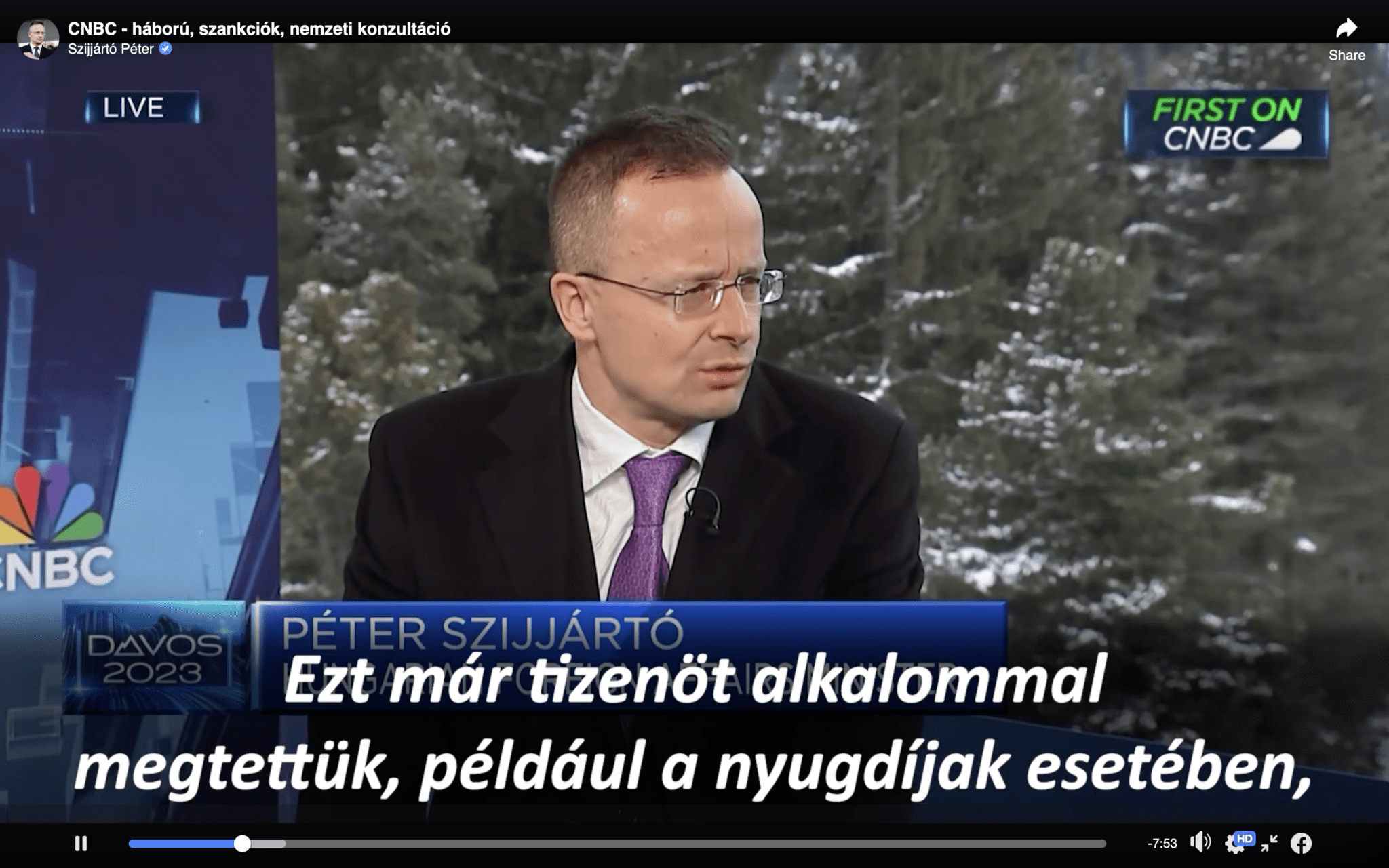Hungarian Foreign Minister Péter Szijjártó conducted an interview with U.S. business television network CNBC on the sidelines of the World Economic Forum in Davos, where he spoke about his government’s ongoing dispute with the EU, its opposition to sanctions on Russia, and the future of Hungary in the EU.
The CNBC host first asked Szijjártó about the country’s recent national consultation survey, which the government routinely sends to all Hungarian citizens. The most recent one saw 97 percent of Hungarians saying they reject sanctions on Russia and wish Europe would end these sanctions.
The host stated that Hungary appears to be taking a hostile stance on the issue of Russian sanctions, which runs in opposition to the opinion of other EU member states.
Szijjártó responded by saying, “Look, we have been in office for more than 12 years now. And we usually ask for the opinion of the people on all important issues. So for 15 occasions already, we have done so, when it was about pensions, about migration, about family issues, about the constitution itself, and now about the sanctions because this is how we govern. When it comes to a milestone, when it comes to a very, very serious issue. We ask for the opinion of the people.”
The minister continued, saying, “We have around 8.5 million people who are above the age of 18, and 1.4 million have participated in a national consultation, which is a big figure. I mean, if you see it proportionally. And these people made it very clear that the sanctions are harmful, and they don’t want sanctions anymore.”
The foreign minister then told CNBC that if the impact of the sanctions is examined, it is clear they have harmed Europe more than they have harmed Russia, and they have certainly not brought Russia’s economy to a standstill or ended the war.

“So, if you look at it in a pragmatic way, not in a political or ideological way, what was the impact of the sanctions? You see that the sanctions are more harmful to Europe than to Russia. So, that’s why we should not move forward with the sanctions, because simply they have not fulfilled the expectations and the targets we have attached,” he said.
Szijjártó indicated that Hungary condemns the war and is standing with Ukraine, but “the question is whether the sanctions have helped us — the international community, Europe, whoever — to come closer to peace, because I don’t think they helped. And once again, we condemned the war, but we should not harm ourselves more, because, at the end of the day, we will have to contribute to reconstructing Ukraine. But if we ruin our own economies, we will not be in a position to help Ukraine to be reconstructed.”
[pp id=26930]
Hungary’s foreign minister also discussed the ongoing battle between the EU and Hungary, which has seen Brussels withhold billions in euros from the Hungarian government, a move that has shaken Hungary’s economy and contributed to instability for Hungary’s currency. The EU’s desire to punish Hungary has, in turn, led to a serious decline in the material wealth and well-being of the Hungarian people.
“So, the European Union is withholding money from us, which is ours, because the European funds are not falling down from the sky, they are not coming from scratch. They are outcomes of the economic performance of the European community including Hungary, including the Hungarian people. So this is our money.”
He indicated that the money is being withheld for political reasons, and there is no legal basis for the EU’s actions.
“Brussels hates that there is an anti-mainstream, right-wing, patriotic Christian Democratic government in Hungary for more than 12 years now, and it is still successful,” he said.
[pp id=24013]
When the CNBC host asked Hungary’s foreign minister whether his country has any plans to leave the EU, Szijjártó responded that they are a proud member of the EU, and Hungary has no plans to leave, but that there are two different visions regarding what the EU should be.
“One approach would like to see the future of the European Union as a United States of Europe. This is definitely what we oppose. We think the European Union will be strong if the member states themselves are strong. And I told you that our debate with the institutions in Brussels is political. Because I mean, we in Hungary have been in office for 12 and a half years with a right-wing government, a successful one, definitely against the mainstream, and Brussels hates that.”
He also discussed the media landscape in Hungary, saying there is a free media, but it is one where both liberal and conservative opinions are freely discussed,
“When they say that there’s no free media in the country, yes, there is free media, but it’s not entirely liberal. Half and half, conservative and liberal, but it’s free. It’s colorful, much more colorful than in Europe. If you look around in the western part of Europe, media is like 95 percent liberal,” said Szijjártó
Despite claims of a lack of democracy, the Hungarian government has received a democratic mandate that far surpasses many other Western nations, argued Szijjártó.
“And you know, one thing everybody must respect. And this is the will and the decision of the Hungarian people. And the will of the decision of the Hungarian people has been represented or has been expressed in four continuous parliament elections with a landslide victory on our side.”






